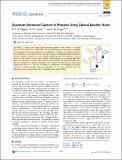Files in this item
Quantum-enhanced capture of photons using optical ratchet states
Item metadata
| dc.contributor.author | Higgins, Kieran | |
| dc.contributor.author | Lovett, Brendon William | |
| dc.contributor.author | Gauger, Erik | |
| dc.date.accessioned | 2017-10-17T14:30:13Z | |
| dc.date.available | 2017-10-17T14:30:13Z | |
| dc.date.issued | 2017-09-28 | |
| dc.identifier | 251117881 | |
| dc.identifier | 6ed7993f-8df4-464d-a42e-daea79ef1f69 | |
| dc.identifier | 85030450603 | |
| dc.identifier | 000412150500018 | |
| dc.identifier.citation | Higgins , K , Lovett , B W & Gauger , E 2017 , ' Quantum-enhanced capture of photons using optical ratchet states ' , Journal of Physical Chemistry C , vol. 121 , no. 38 , pp. 20714–20719 . https://doi.org/10.1021/acs.jpcc.7b07138 | en |
| dc.identifier.issn | 1932-7447 | |
| dc.identifier.other | ORCID: /0000-0001-5142-9585/work/47136562 | |
| dc.identifier.uri | https://hdl.handle.net/10023/11867 | |
| dc.description | This work was supported by the EPSRC and the Leverhulme Trust. BWL thanks the Royal Society for a University Research Fellowship. EMG acknowledges support from the Royal Society of Edinburgh and the Scottish Government. | en |
| dc.description.abstract | Natural and artificial light harvesting systems often operate in a regime where the flux of photons is relatively low. Besides absorbing as many photons as possible, it is paramount to prevent excitons from annihilation via photon re-emission until they have undergone an irreversible energy conversion process. Taking inspiration from photosynthetic antenna structures, we here consider ringlike systems and introduce a class of states we call ratchets: excited states capable of absorbing but not emitting light. This allows our antennae to absorb further photons while retaining the excitations from those that have already been captured. Simulations for a ring of four sites reveal a peak power enhancement by up to a factor of 35 owing to a combination of ratcheting and the prevention of emission through dark-state population. In the slow extraction limit, the achievable power enhancement due to ratcheting alone exceeds 20%. | |
| dc.format.extent | 2348495 | |
| dc.language.iso | eng | |
| dc.relation.ispartof | Journal of Physical Chemistry C | en |
| dc.subject | QC Physics | en |
| dc.subject | QD Chemistry | en |
| dc.subject | TK Electrical engineering. Electronics Nuclear engineering | en |
| dc.subject | DAS | en |
| dc.subject.lcc | QC | en |
| dc.subject.lcc | QD | en |
| dc.subject.lcc | TK | en |
| dc.title | Quantum-enhanced capture of photons using optical ratchet states | en |
| dc.type | Journal article | en |
| dc.contributor.sponsor | The Royal Society | en |
| dc.contributor.institution | University of St Andrews. School of Physics and Astronomy | en |
| dc.contributor.institution | University of St Andrews. Condensed Matter Physics | en |
| dc.identifier.doi | https://doi.org/10.1021/acs.jpcc.7b07138 | |
| dc.description.status | Peer reviewed | en |
| dc.identifier.url | http://pubs.acs.org/doi/suppl/10.1021/acs.jpcc.7b07138 | en |
| dc.identifier.grantnumber | UF100020 | en |
This item appears in the following Collection(s)
Items in the St Andrews Research Repository are protected by copyright, with all rights reserved, unless otherwise indicated.

